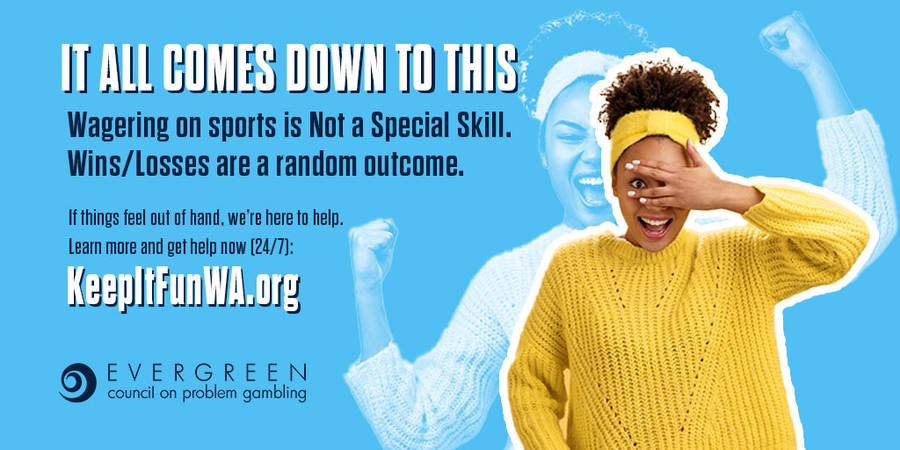All Press Releases for March 16, 2023
Problem Gambling Awareness Saves Lives and Reduces Risks for Those Who Have Served
Problem Gambling Awareness for Military/Veterans and Sports Betting Safety
Stigma, lack of access to effective behavioral health services, and fear of consequences all contribute to significantly low rates for seeking help.
OLYMPIA, WA, March 16, 2023 /24-7PressRelease/ -- March is Problem Gambling Awareness Month (PGAM). The Evergreen Council on Problem Gambling (ECPG), Washington State Affiliate of the National Council on Problem Gambling (NCPG), together with the State Problem Gambling Program at the Washington State Health Care Authority (HCA) within the Division of Behavioral Health and Recovery (DBHR), is raising awareness of how problem gambling (gambling disorder) impacts those in military active duty, veterans, individuals, families, and communities known to be at higher risk, with a statewide media campaign.
On a national level, ECPG will be collaborating with partners at NCPG, HCA, and others, to coordinate awareness campaigns not just throughout the month of March but continuing throughout the year in Washington state and across the country.
Why Problem Gambling Awareness is Important to Public Health
Problem Gambling/Gambling Disorder (often referred to as gambling addiction) is often labeled the hidden addiction because the brain is affected similarly to drug and alcohol addictive disorders, but without the same outward symptoms or ability to conduct physical testing, which may cause the gambling disorder to go undetected for prolonged periods of time. This can manifest feelings of loneliness and isolation in those impacted, which may contribute to negative repercussions in the life of the individual, their families, friends, and loved ones and employers, affecting finances, mental health, co-occurring disorders, family health, and leading to thoughts of suicide. One study found that among those with Gambling Disorder (prev. pathological gambling) who had previously sought treatment for Substance Use Disorders, 41% had attempted suicide. For those who had previously sought professional treatment for their gambling, 27.6% had attempted suicide. (Petry & Kiluk, 2002)
Fighting for Mental Health Services for Those Who Serve
When most people think of those who serve in our Military — active-duty personnel and veterans — terms such as Honor, Strength, and Courage come to mind. What happens when a servicemember needs help for trauma-related issues, addiction, or other behavioral health concerns? Stigma, lack of access to effective behavioral health services, and fear of consequences all contribute to significantly low rates for seeking help.
Retired and active-duty service members need accessible and effective behavioral health services. Their lives may depend upon it. This campaign showcases recognized leaders who work to support active-duty military and veterans and who have lived experience to share about the consequences and unintended consequences of military service on behavioral health equity; risk and resilience factors, and resources for support. Visit: militarygamblingsupport.org
The Rise of Sports Gambling
Sports betting can be fun – but like anything that involves a good time, there can also be risks. Super Bowl 2023 saw record numbers of bets as it was played in a state with legalized sports betting. According to CNBC.com, FanDuel reported taking 50,000 bets per minute at its peak, and GeoComply recorded a 25% increase in transactions over last year, with more than 100,000 transactions just in or around State Farm Stadium in Glendale. The American Gaming Association estimated that bettors would wager $16 billion on this year's Super Bowl.
"While gambling can be fun entertainment, for most people, we know that the need for support services, treatment, prevention, and recovery programs are crucial," said Maureen Greeley, Executive Director of the Evergreen Council on Problem Gambling. "The need to raise awareness is more important than ever with the explosive growth of legalized sports wagering in Washington State and nationally. Opportunities to gamble more frequently on activities that are part of the most popular pastime in our society – sports – raises the profile of gambling and the extensive increase in advertising of sports betting before individuals of all ages. Partnering with Tribal Gaming, Sports programs, and Sports Betting organizations on Responsible Gambling and Prevention efforts is a key part of our efforts to help Washingtonians make healthy choices around gambling activities."
Check out ECPG's KeepItFunWA.org page for information and resources about sports betting, statistics, pointers for betting smart and preventing problems, and resources for help.
Washington State's 24-hour Problem Gambling Helpline
ECPG has provided the Washington State Problem Gambling helpline for more than 25 years and helps between 5,000-10,000 callers per year. The helpline is confidential, available 24 hours a day, 7 days a week, and connects people to free or low-cost treatment services closest to them. Resources and information are provided for anyone impacted by problem gambling or Gambling Disorder, including individuals, family members, and loved ones.
If gambling is creating problems for you and your family, there is help and hope.
Help Starts Here.
Call. Text. Chat.
Call or text 1-800-547-6133 or visit www.evergreencpg.org to chat.
Recursos en español: www.evergreencpg.org/es
About Evergreen Council on Problem Gambling
Evergreen Council on Problem Gambling (ECPG) is committed to providing services and programs for individuals, their families, employers, students, treatment professionals, and the greater community through problem gambling treatment support, information and education, advocacy, research, and prevention efforts.
For more information visit: www.evergeencpg.org
About the Washington State Health Care Authority Problem Gambling Program
The State Problem Gambling Program provides funding for treatment for eligible individuals and their family members who are affected by problem gambling or Gambling Disorder (DSM-5). The program also provides limited funding towards clinical training and scholarships, prevention and awareness activities, and other services provided by the Evergreen Council on Problem Gambling.
For more information visit:
https://www.hca.wa.gov/free-or-low-cost-health-care/i-need-behavioral-health-support/problem-gambling
# # #
Contact Information
Evergreen Council on Problem Gambling
Olympia, Washington
United States
Voice: 360-352-6133
E-Mail: Email Us Here
Website: Visit Our Website
Blog: Visit Our Blog
Follow Us:






